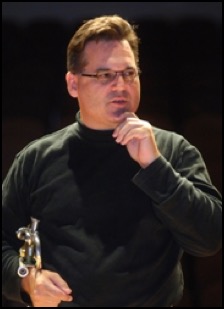Berntsen Masterclass
15/03/20

If you have attended a masterclass it should be no surprise that he stressed good use of air in a relaxed approach as the foundation of technique. Uniquely though, he was able to get students to immediately employ his techniques for a dramatic improvement in tone. He stressed straight air with the idea that louder dynamics are further away.
Neal exhorted the students to increase their dynamic range in novel way. The musician sees the notation of the dynamic, feels the process of making the dynamic and finally hears the dynamic. The performer experiences dynamics in three distinct ways, the audience only gets to hear the dynamic so performers must exaggerate by two thirds.

He offers many of the points he made on his website through his warm up called Rituals http://nealberntsen.com/teaching-aids/ .
“Good playing is the result of a relaxed, efficient airflow. Conversely; bad tone, missed notes, unclear articulation and poor intonation are often the result of body tension, which results in a restricted airflow. More specifically: a restriction in the release of a phrase’s first note. This concept is one of the fundamentals of the Cichowicz philosophy. Over time it became clear to me that in order to play consistently at a high level, I needed to create a path that would lead me to a relaxed, efficient airflow on a daily basis.

His students at Carnegie Mellon are lucky to have such a dedicated educator.
